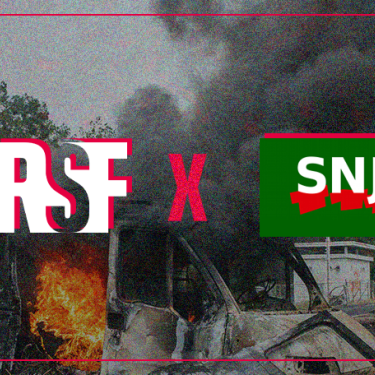RSF and the French National Union of Journalists (SNJ) provide protective equipment for journalists in New Caledonia

Reporters Without Borders (RSF) has been working alongside journalists in New Caledonia since the clashes erupted in Nouméa on 13 May, following the controversial adoption of the reform to enlarge the National Assembly electorate. The organisation has activated channels of discussion with the authorities to guarantee their safety and is now providing them with protective equipment, in partnership with the National Union of Journalists (SNJ).
RSF has joined forces with the SNJ in Nouméa and Paris to respond to the urgent needs of journalists in New Caledonia, which have been expressed to these organisations since the outbreak of the crisis on 13 May 2024.
RSF has collected around fifteen testimonies from journalists who have been insulted, threatened or assaulted while carrying out their work in close proximity to the tensions. Unable to count on the support of a major media company to provide them with protective equipment, freelance journalists or those working for newsrooms with limited resources are the most vulnerable.
“Here, since the start of the riots, the vast majority of journalists have been going out into the field without any equipment, because they don't have adequate supplies. Even the public service is under-equipped. Yet the risk is real every time we report. Flashballs and live ammunition are frequently exchanged, and most Caledonians carry hunting rifles. In less than two weeks, these riots have claimed seven victims, all by firearms. At the SNJ, we are calling on media companies employing journalists in New Caledonia to do everything in their power to guarantee the safety of those whose job it is to provide information.
The initiative taken by RSF and the SNJ is therefore aimed at giving news professionals the opportunity to obtain protective helmets and badges identifying them as journalists. The fear of being targeted as a journalist is such that these badges are removable. Bullet-proof and blade-proof waistcoats have also been offered to journalists who identify the need.
“RSF reaffirms its support for journalists in New Caledonia who report the news and help to inform the world about what is happening on the ground in all its complexity. We reiterate our appeal to the authorities to guarantee the safety and free movement of journalists throughout the territory, so that they can continue their work and thus ensure the right to plural, reliable and independent information for the local population and beyond.
The exceptional circumstances in New Caledonia, including the cancellation of at least all commercial flights until 2 June, meant that the RSF team had to mobilise equally exceptional resources to deploy this material aid from Paris. The protective equipment was flown in a military aircraft to La Tontouta airport in Nouméa, before being received at the office of the High Commissioner of the Republic by members of the SNJ who were on site, to be distributed free of charge to journalists who had previously expressed their need to RSF. RSF would like to thank the Ministry of the Interior for transporting the equipment.
On 28 May, the state of emergency declared by the President of the Republic on 15 May was lifted throughout New Caledonia. The curfew, which prohibits all movement on public roads and in public places from 6 p.m. to 6 a.m., remains in place, but journalists are still exempt. To date, seven people have been killed and several injured in the clashes.
